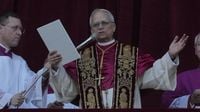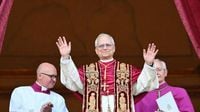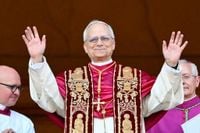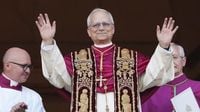On May 8, 2025, Robert Prevost of the United States was named Pope Leo XIV, marking a historic moment as he becomes the first American pope in the 2,000-year history of the Catholic Church. The Chicago-born cardinal, who dedicated much of his life to missionary work in Peru, addressed the crowd at St. Peter’s Square for the first time as the newly elected pontiff. In his inaugural message, Leo XIV, aged 69, expressed a commitment to peace, dialogue, and missionary evangelization, stating, “Peace be with you.”
Cardinal Prevost was elected during a conclave that saw 135 eligible cardinals participating in a secretive voting process. The election required a two-thirds majority, and Leo XIV secured at least 89 votes from the participating cardinals. His election is seen as a significant moment not only for American Catholics but also for the global church, which has been marked by divisions between conservative and progressive factions.
In his first address, Leo XIV emphasized the importance of a church that seeks peace and is close to those who suffer. He wore the traditional red cape of the papacy, a garment that his predecessor, Pope Francis, had chosen to forego. Speaking initially in Italian, he later switched to Spanish, a language he is fluent in due to his extensive work in Peru. He specifically addressed his former diocese in Chiclayo, saying, “Greetings... to all of you, and in particular, to my beloved diocese of Chiclayo in Peru, where a faithful people have accompanied their bishop, shared their faith.”
The new pope’s choice of the name Leo XIV carries significant historical weight. The name Leo has been associated with strong leadership and doctrinal fortitude, particularly in reference to Pope Leo XIII, who was known for his encyclical on social justice. According to Professor Bruce Morrill of Vanderbilt University, this choice reflects Leo XIV’s priorities, suggesting a commitment to addressing social issues and the needs of the marginalized.
Ecumenical Patriarch Bartholomew welcomed the new pope, expressing hopes for continued dialogue between the Catholic and Orthodox churches. He stated, “I greet the new Pope, the new Bishop of Rome, with great brotherly love in Christ and great expectations.” This sentiment highlights the potential for unity among Christian denominations under Leo XIV’s leadership.
The election of Leo XIV has also sparked reactions from political leaders. Former U.S. President George W. Bush shared his joy, calling it a “historic and hopeful moment for Catholics in America and for the faithful around the world.” President Donald Trump echoed similar sentiments, stating, “It is such an honor for our country that the newest pope is American.”
Leo XIV’s background is particularly notable. He was brought to the Vatican by Pope Francis in 2023 to lead the office that vets bishop nominations, a role that positioned him as a prominent figure within the church. His election is seen as a continuation of Francis’ vision, particularly in terms of reforming the church’s leadership structure. In early 2025, Francis appointed Prevost to the rank of cardinal, further solidifying his influence within the Vatican.
As Pope Leo XIV, his first official acts will include celebrating Mass with cardinals in the Sistine Chapel and delivering his first Sunday blessing from the loggia of St. Peter’s Basilica. Vatican spokesman Matteo Bruni confirmed these plans, indicating that the new pope aims to establish a strong connection with the church’s followers from the outset.
In Peru, where Prevost spent decades as a missionary and bishop, the news of his election has been met with pride and enthusiasm. Isabel Panez, an elementary school teacher in Lima, remarked, “For us Peruvians, it is a source of pride that this is a pope who represents our country.” Prevost’s commitment to social justice and human rights during his time in Peru has left a lasting impression, with many believing he will carry these values into his papacy.
As the first American pope, Leo XIV's election is expected to have implications for the future of the U.S. Catholic Church, which has faced significant challenges in recent years. The divide between conservatives and progressives has been a source of tension, and Prevost’s leadership will be closely watched as he navigates these complexities. His experience as a moderate and a bridge-builder may serve him well in fostering dialogue and unity within the church.
In his first message to the world, Leo XIV called for a church that is “sinodal,” emphasizing the need for collective decision-making and a focus on the marginalized. He stated, “We can all walk together,” reinforcing his vision of inclusivity and collaboration within the Catholic community.
The excitement surrounding the election of Pope Leo XIV has resonated across the globe, with many expressing hope for a renewed emphasis on social justice, environmental concerns, and interfaith dialogue. As the new pontiff prepares to take on the responsibilities of leading the world’s 1.4 billion Catholics, his first words and actions will set the tone for his papacy.
In a time of great uncertainty and division, the election of Pope Leo XIV represents a moment of potential transformation for the Catholic Church. His commitment to peace, dialogue, and social justice may resonate with many who seek a more compassionate and inclusive church in the years to come.







